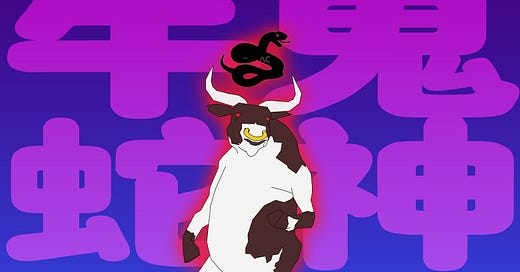‘Cow demons and snake spirits’ — Phrase of the Week #103
China's richest man comes under fire from online nationalists
Our phrase of the week is: "Cow demons and snake spirits" (牛鬼蛇神 niúguǐ shéshén)
Context
China’s wealthiest person, Zhōng Shǎnshǎn 钟睒睒, the founder of Nongfu Spring (农夫山泉 nóngfū shānquán), the Hangzhou-based bottled water and soft drinks giant, has come under fire from online nationalists.
The attacks started in late February following the death of Zōng Qìnghòu 宗庆后, the founder of Wahaha Group, a competitor of Nongfu also headquartered in Hangzhou.
Nationalist influencers, also known as “positive energy bloggers” (正能量博主), praised Zhong Qinghou and Wahaha being patriotic, while criticising Zhong Shanshan for being “unpatriotic.” His company, Nongfu Spring, is accused of being “pro-Japan,” because of what is interpreted as Japanese imagery used in the artwork of Nongfu products.
As billions of dollars were wiped from Nongfu Spring’s Hong Kong-listed business, and despite many people in the media and on social media calling for calm, the crisis shows no signs of subsiding.
The attack on Nongfu Spring has been going on for a week with no sign of cooling down. Instead, as cow demons and snake spirits and internet celebrities waded in, this crisis has intensified.
针对农夫山泉的这场危机已经轰轰烈烈开展了一个星期,话题热度不仅没有自然冷却,反而随着各路牛鬼蛇神和流量博主的加入有愈烧愈旺之势。
Zhēnduì nóngfū shānquán de zhèchǎng wēijī yǐjīng hōnghōnglièliè kāizhǎnle yíge xīngqī, huàtí rèdù bùjǐn méiyǒu zìrán lěngquè, fǎn'ér suízhe gèlù niúguǐ shéshén hé liúliàng bózhǔ de jiārù yǒu yùshāoyùwàng zhī shì.
And with that we have our Sinica Phrase of the Week!
What it means
“Cow demons and snake spirits” is a Chinese idiom which directly translates as "cow demons" (牛鬼 niúguǐ ), and "snake spirits" (蛇神 shéshén).
The idiom was first coined by Tang dynasty poet, Dù Mù 杜牧, in the foreword to Collection of Poems by Li He (李贺集序 Lǐ Hè jí xù), published in 831, praising the fantastical elements of Li's poetry.
Li He was a talented but short-lived poet of the middle Tang dynasty, whose works are still popular today.
The original reference in Du's foreword is:
The spouting whales, the leaping sea turtles, the cow demons, and the snake spirits - these are not enough to describe the surreal, wild, and fantastical nature of Li's works.
鲸呿鳌掷,牛鬼蛇神,不足为其虚荒诞幻也。
jīngqū áozhì, niúguǐ shéshén, bùzú wéiqí xūhuāngdànhuàn yě.
In this context, “cow demons and snake spirits” describes the “fantastical animals” in Li’s poetry.
In more recent times, the idiom was used as a figure of speech to describe perceived enemies during the early years of communist rule in China.
Mao Zedong used the reference in numerous speeches and letters. The first time was in 1957 at the National Propaganda Work Conference of the Communist Party:
Recently, some bad elements have entered the stage.
最近一个时期,有一些牛鬼蛇神被搬上舞台了。
zuìjìn yíge shíqī, yǒuyìxiē niúguǐ shéshén bèi bānshàng wǔtái le.
The phrase became an entire movement during the Cultural Revolution, following the publication of the editorial "Sweeping Away All Monsters and Demons" (横扫一切牛鬼蛇神 héngsǎo yīqiè niúguǐ shéshén) in People’s Daily on 1 June 1966.
“Monsters and Demons” were reactionary elements and class enemies who were vilified during the Cultural Revolution.
Following the publication of the People's Daily piece, which came shortly after the 16 May Notification and the start of the Cultural Revolution, the Red Guards began a purge across the country, persecuting all those ostensibly fitting the description of "monsters and demons."
In modern Chinese, the meaning has evolved again. The idiom is widely used to describe “bad people,” or “bad elements.”
In the context of Nongfu this week, ironically, “cow demons and snake spirits” is a criticism of overly nationalistic voices, the opposite of the "monsters and demons" of the Mao years.
So we translate the idiom and our Phrase of the Week as "nationalist trolls" in this context.
Andrew Methven is the author of RealTime Mandarin, a resource to helping you learn contemporary Chinese in context, maintain and improve your Mandarin skills, and stay on top of the latest language trends in China.
Read more about how the Nongfu Spring controversy is being discussed in the Chinese media in this week’s RealTime Mandarin.






Thanks for providing context for this golden oldie from the GPCR.